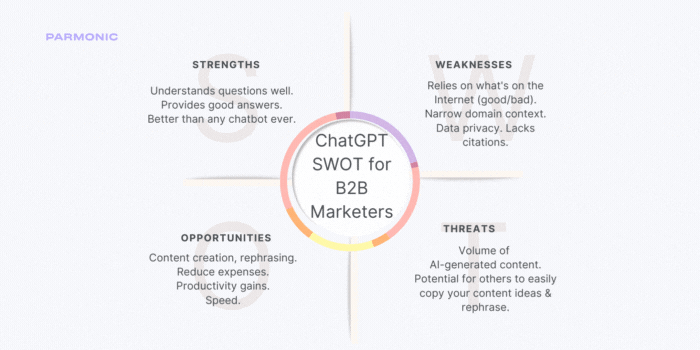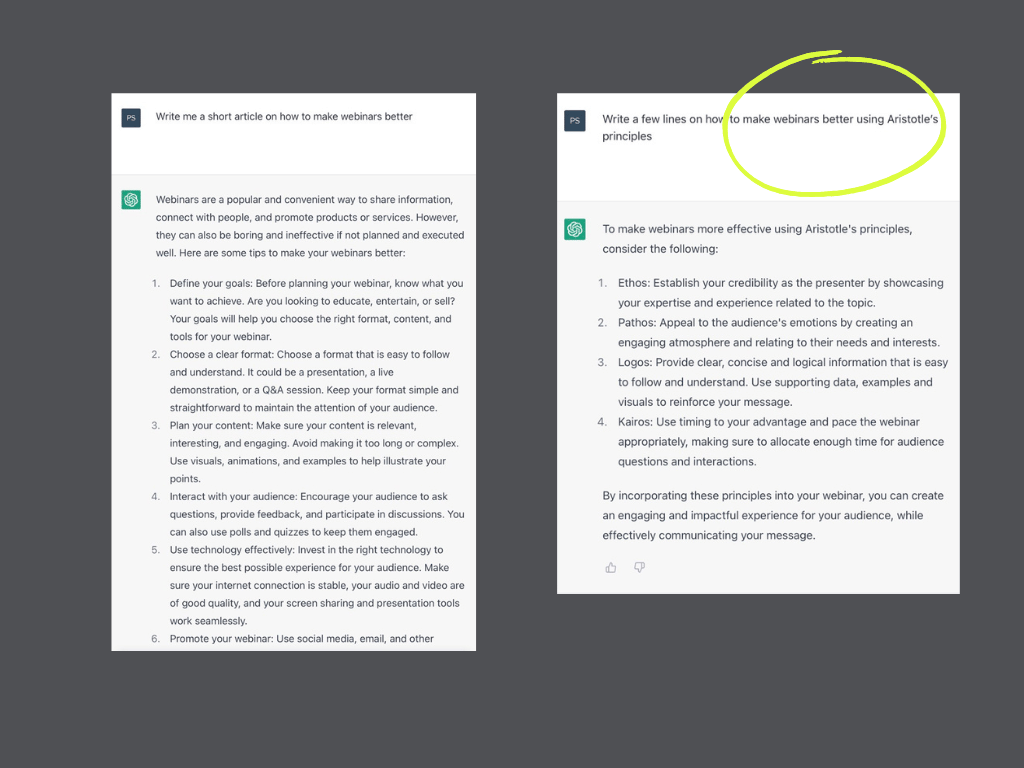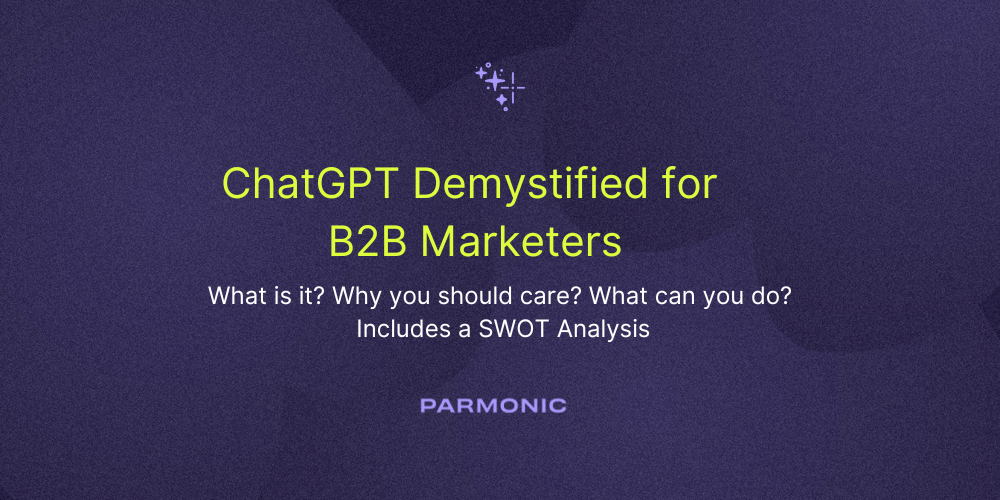ChatGPT Demystified for B2B Marketers
This is a long but easy-to-navigate article.
Here's a summary SWOT if you are a B2B marketer.

ChatGPT has taken the world by storm. Here's a quick guide to help you understand what it is, non-technical overview of how and why it works, and its implications on the role of marketers, the craft of marketing and the world of business.
Topics covered:
- What is ChatGPT?
- How does it work? Explain in intuitive terms, not geek-speak.
- Why you should care?
- Who will win? Who will lose? Part A
- Who will win? Who will lose? Part B
- Limitations
- Where to go from here?
I live in Atlanta. There was once a toll booth here that used to charge 50 cents. We will metaphorically stop at that toll booth in our journey today.
What is ChatGPT?
A chatbot that allows you to ask questions about a LOT of things.
So what's the big deal? Haven't we seen enough chatbots in the last ten years?
Yes, we've seen a lot of (dumb) chatbots. What's remarkable about ChatGPT is the quality of its outputs. It provides very impressive (and mostly correct) answers. If Siri and Alexa are kindergartners, ChatGPT is in college. It does remarkably well at understanding and answering questions.
How is that possible? How does it work?
It's hard to explain (and understand) AI in simple, intuitive terms. That's a task even ChatGPT couldn't do well. Let's start with two fundamentals.
Fundamental #1
The world is made of people and things (together let's call them objects). Objects have qualities. They do things, and have relationships to other things.
Our ancestors developed language as means to communicate about the world.
As our species evolved from spoken word to written language, the rules of language became more important to define.
Flashback to elementary school grammar - there are 8 parts of speech that make up the ingredients of language. Here are the key ones:
- Objects = nouns, pronouns
- Qualities = adjectives, adverbs
- Actions = verbs
- Relationships = prepositions
Fundamental #2
Computer Science (and sciences, in general) depends on modeling a solution to a problem. Before you can write code, you need an algorithm. In order to develop algorithms you need to create a model of the solution. Models make things computable. They are a necessary but not sufficient condition.
If you can model it, you can (usually) build it.
The English language with its parts of speech and syntax is a way to model the world. We humans have been using it for centuries.
We could feed that model to computers but the results so far were not impressive because so much can be said and asked in language. It's so vast. Simply rephrasing something could easily trip a computer. It was almost like taking words from a dictionary, writing each word on a paper strip, and putting all these paper strips in a box. Computers could easily find individual words but lacked a true model that captured qualities and relationships between different things.
Training a computer (aka building algorithms) to build a robust model of the (Internet) world using the rules of English language has been a daunting task.
AI (Deep Learning, in particular) has progressed immensely in the last few years. While it was born more than fifty years ago, (the perceptrondeserves credit) it has become more robust and useful since scientists have spent so many years on improving techniques and building on top of existing knowledge.
OpenAI took Deep Learning models developed over the past few decades, tweaked them, collected LOTs of data* (pretty much a copy of the world wide web), used humans to classify and tag some of the data, and solved the problem of building a model of the world using English-language structures.
ChatGPT is a technology that unpacked the Internet into parts of speech of the English language, and maintains a graph of how each entity is related to others.
This gives it the ability to "understand" questions and provide good answers. It gives it the ability to perform many language-related tasks like writing content, summarizing content, rephrasing content.
It's an orbital leap in technology.
*ChatGPT has parsed most of the Internet. While it's creators don't officially disclose what exactly it has parsed, publicly-available research papers indicate they've used most of the large research datasets available in AI research in addition to Wikipedia, public-domain books and public content on the Internet. The fact that they don't officially disclose data sources raises troubling questions about data sets that they might have parsed without permission or consent.
Technically speaking, ChatGPT is a chatbot interface to a language model called GPT3.5. GPT is available as a cloud service and is used by a plethora of companies. Language models have been around for a while but have been getting significantly better in the last 2-3 years.
Deep Learning is based on Neural Networks, and Neural Networks try to mimic how our brains work. Neurons receive inputs and send output signals to other neurons. Under the hood of Deep Learning, that's what "circuits" are doing in a multi-billion-dimensional space. Our understanding of the human brain is still limited so AI models also suffer from that limited understanding.
Why you should care?
Several language-related tasks can now be performed by software. While this technological leap will impact every human who uses customer service, search, etc., B2B marketing is ripe for early use cases.
- Some tasks will become easier - e.g. editing copy, writing a blog post, summarizing docs.
- Some tasks will become harder - if everyone is using GPT-based tools to produce content, the quality bar on great content will go up (and that might be a good thing for A-grade marketers).
- You can lower certain expenses - like outsourced content creation especially if you receive average quality back.
- Many tools you might already be using will become more user friendly - imagine asking Google Analytics a question and getting the right answer back.
- Productivity will go up - marketers can now perform certain tasks without waiting on others.
- Creativity will go up - AI assistants are often really good starting points for content creation.
Who will win? Who will lose? Part A
A-grade marketers and A-grade teams will thrive.
If your progress has been hampered by waiting on others for certain tasks, you will be a winner. You will be able to do things faster and cheaper.
This advancement will be a boon for creative marketers. Good ideas and insights will now command even more respect. Creativity as a currency just became more valuable.
While ChatGPT is great, no AI is able to synthesize ideas as well as humans. The reason is not technical - the reason is that there are infinite ways to synthesize ideas. That's the gist of 'creativity'.
The image below shows two outputs from ChatGPT. On the left is a short piece of content on how to make webinars better. It's quite well-written but also quite average in terms of ideas. On the right is another piece of content on how to make webinars better by applying Aristotle's principles. Synthesizing these two concepts of 'making webinars better' and 'applying Aristotle's principles' produced a much more valuable piece of content (or at least a great starting point).

The ability to synthesize ideas into valuable end products (content) is now more important than ever.
If, however, you are doing things that AI can now do, it's time to pause and reflect.
B-grade marketers and teams will either have to upgrade themselves or live in constant fear. B-grade copywriters, B-grade content creators are at risk of becoming irrelevant. Agencies charging clients for low-level, not-really-creative work will find it hard to compete with technology that performs as well (if not better) as them.
Remember that toll booth I mentioned at the beginning of this article?
The people sitting at that toll booth had a mundane task to do. Despite their best attempts rush hour would lead to long lines. Those folks had no room to be creative or contribute more.
The toll booth doesn't exist anymore. It was dismantled by electronic tolls. Now traffic moves without halting. Note that traffic is still a problem, and that's the good news - there is and will be enough for humans to solve.
Progress solves legacy problems and creates new ones worth solving.
Bank tellers didn't go away due to ATMs. They are still around, and now use machines instead of saliva to count currency notes that the local business owners are depositing.
Who will win? Who will lose? Part B
- A new class of winners will emerge who will be able to take advances like GPT and build it into their own recipes that use domain expertise, non-obvious and proprietary data sets, additional AI techniques and models, ingenuity in understanding customer needs and workflows, and obsession with delivering lovable products and services backed by stellar customer service. (Shameless self-promotion: Here at Parmonic we have been experimenting with GPT for more than a year and are already adding it to our mix).
- Big Tech companies like Microsoft plan to sell GPTx and ChatGPT as cloud services to other businesses. They will reap significant benefits selling Cloud services.
- The quality of many software tools will improve if they incorporate GPTx. Sentiment analysis of social media posts has been an exciting space with disappointing products. There will be a marked improvement in these areas.
- Companies that have spent a lot of money and time on building comparable language models and chatbots will have a rude awakening, and may not be able to compete with GPTx and ChatGPT. The bar was just raised significantly.
Limitations and Open Questions
According to research papers published by its creators, ChatGPT's performance declines when documents get longer or context gets wider. It works very well on wide topics which have lots of published information on the Internet, but not so well on narrow topics.
It also doesn't understand context and perspectives very well.
E.g. I asked it to create a SWOT of itself for B2B marketers. While what it created was correct (and that's remarkable), it was not worth putting in this blog post because it doesn't understand the context as a B2B marketer.
It suffers from limitations that language suffers from. If a topic is abstract and all the available information on that topic is abstract, ChatGPT is unable to overcome that abstractness. A more worrisome issue is that if the Internet is full of misinformation about a topic, ChatGPT may blindly convey that.
Garbage In, Garbage Out still holds true.
Another limitation is that sometimes it is not able to understand true intent. E.g. I fed two versions of the same one-page children's story, and in one case it came up with an incorrect interpretation because of subtlety of language.
ChatGPT works on public datasets. As the GPT and ChatGPT API becomes generally available, other companies will be able to use the underlying models with private datasets. As of this writing, ChatGPT parsed Internet data through the year 2021 so it can't answer questions based on information created after 2021. (I believe this is a short-term limitation).
If your audience types in questions related to your brand, it's likely they will not get answers. ChatGPT has not (yet) provided a way for marketers to submit webpages for indexing similar to how Google offers the ability to submit a sitemap.
ChatGPT does not provide citations with its answers. While it happily parsed content created by others on the Internet, it does not give credit. For marketers using information from ChatGPT to create content this will be a headache. Microsoft's Bing search which now is based on ChatGPT (and in beta) includes citations.
There are lots of open questions about legal compliance and data privacy.
Lastly, while it's certain it will get better we don't yet know how much better will it get. This has been such a significant leap that it's possible we may have to wait a long time for the next significant leap.
Where to go from here?
- Reflect on what slows you down, what causes bottlenecks. Some things can be solved by AI; some workflow tasks can be solved by automation.
- Evaluate aspects of your job that are mundane and time sucks - can you minimize the time spent on those using AI? Language (copy)-related tasks, many video tasks are great candidates.
- Evaluate the current state of AI-based solutions related to main aspects of your job.
- Work on problems that are not obviously solvable by AI. Shift towards higher-order work.
- Understand the limitations of AI today and over the next 5-10 years, and plan your career advancement based on that.
- Develop skills that can help you tell (and distribute) better stories. Focus on getting better at explaining difficult concepts more intuitively. Focus on developing new content themes and content perspectives as those are areas where AI struggles.
- Invest time and energy in creating unique 'raw' content and then repurpose and augment it using AI.
- If you start using ChatGPT, avoid falling into the trap of creating content that is just a rehash of what someone else on the web wrote because that's what ChatGPT learned from. Guard yourself from not just copy plagiarism but also idea plagiarism.
AI will help A-grade marketers stand out from others because the A-graders will use AI to speed up lower-order tasks, and can spend more time on higher-order tasks that require ingenuity and expertise.
While AI content creation will lead to more synthetic content, it will also free up time to focus on more creative content. People who can develop exceptional content will become more valuable.
End Notes:
While ChatGPT has become a viral sensation, similar offerings from Google and the Open-source community are becoming available soon.
If you do webinars and long videos like interviews, you can focus more on the content and less on video editing. Your AI friend, Parmonic, can do the video editing, glamorization, subtitling, hosting and measurement for you.
I am the Cofounder & CEO of Parmonic. Connect with me on LinkedIn.
Parmonic is an AI-powered video automation solution for B2B marketers. Our platform turns long, raw recordings into impactful, short, measurable moments and gives B2B marketers a magical way to do more video with less.
It's used by leading F1000 and mid-market brands, and integrates with popular martech tools. We offer AI and Augmented AI options.
We use home-grown AI, best-of-breed models, domain expertise, proprietary data and deep focus on B2B marketers to deliver success and happiness to our customers. Check out popular use cases and book a demo.



